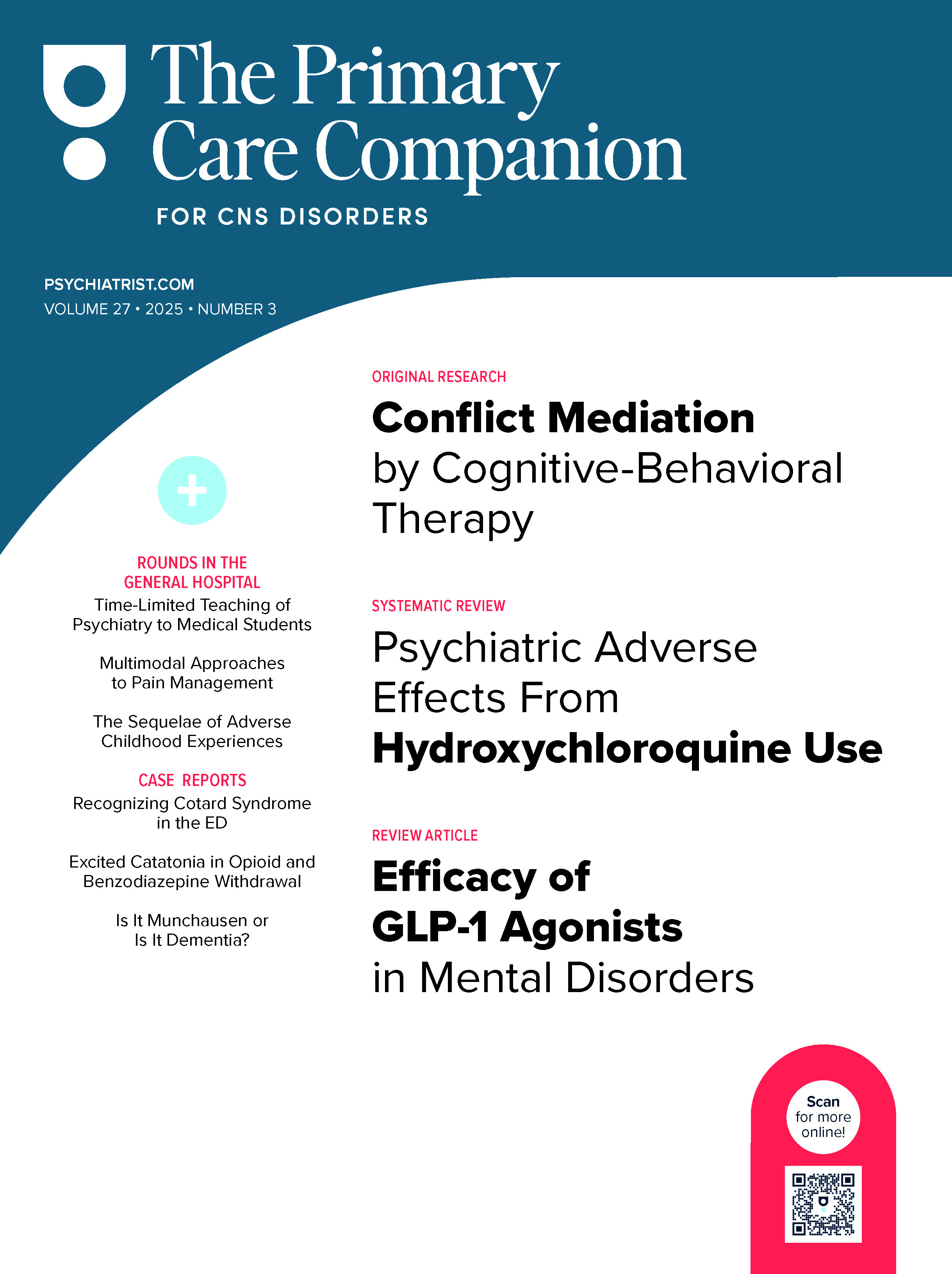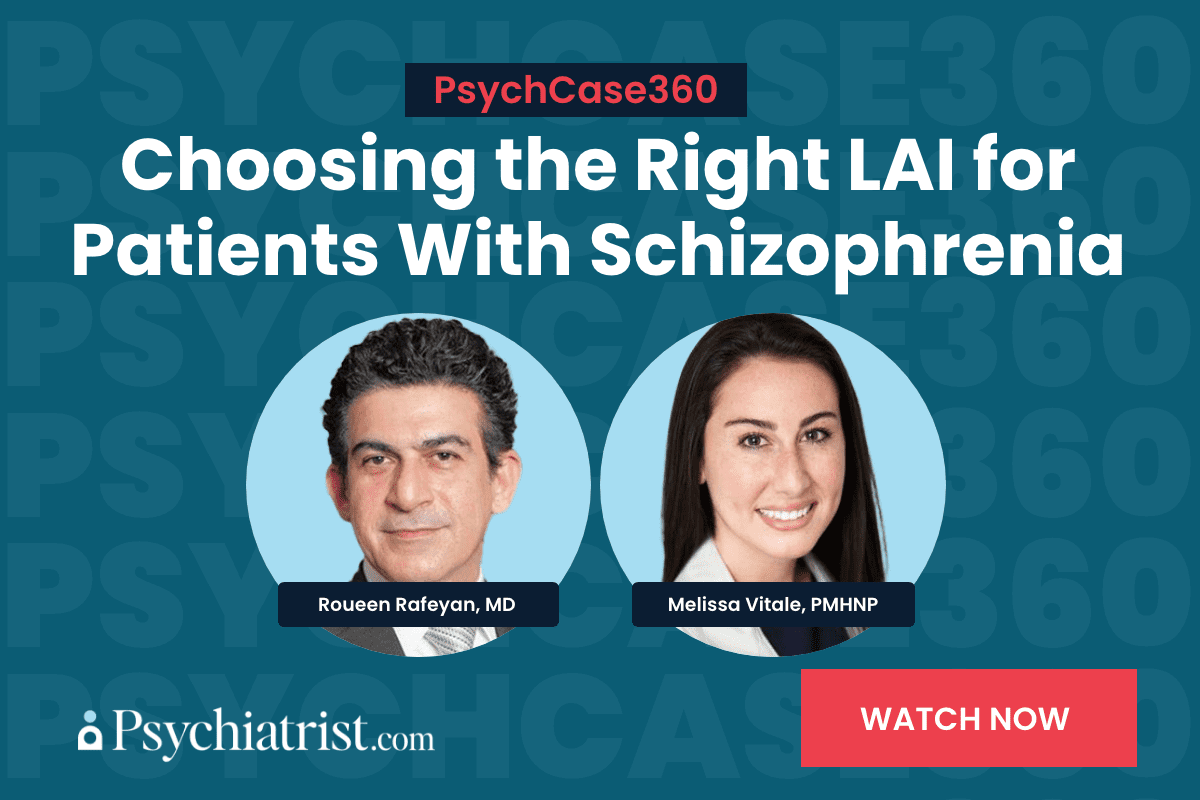In recent years, new treatments for cystic fibrosis have been approved. Among them is elexacaftor/tezacaftor/ivacaftor, a triple combination of cystic fibrosis transmembrane conductance regulator protein modulators that has been available in France since 2021 under the name Kaftrio. This treatment, prescribed in association with an extra tablet of ivacaftor, has revolutionized the management of cystic fibrosis by significantly improving respiratory function and quality of life.1 However, concerns about worsening psychiatric conditions have been raised.2 We report a case of psychiatric symptoms occurring after elexacaftor/tezacaftor/ivacaftor initiation with clinical improvement after dose adjustment.
Case Report
A 38-year-old man with no personal or family psychiatric history was treated with 2 tablets of lumacaftor/ivacaftor 200 mg/125 mg/d for a homozygous Phe508Del cystic fibrosis. This treatment allowed the condition to be stabilized with minimal exacerbations. No side effects were described. However, the patient presented residual respiratory symptoms such as dyspnea and coughing.
In July 2021, lumacaftor/ivacaftor was switched to a standard dose of 2 tablets of elexacaftor/tezacaftor/ivacaftor 100 mg/50 mg/75 mg/d and 1 tablet of ivacaftor 150 mg/d with the intent of decreasing symptoms and improving quality of life. Within a month, lung function improved with a ppFEV1 (percent predicted forced expiratory volume in 1 second) increase from 33% to 40%, and the patient described a significant decrease in dyspnea and coughing.
However, within 2 weeks of treatment initiation, the patient reported moderate anxiety, irritability, and agitation. Those symptoms persisted without worsening until the 6-month checkup, when the patient reported depressive mood as well. Elexacaftor/tezacaftor/ivacaftor dosage was not changed at this time, and no other treatment was introduced. Lung function was stable with ppFEV1 at 42%, and no other respiratory symptoms were reported. In October 2022, an increase in depressive symptoms with occurrence of suicidal thoughts was noted. These symptoms were hypothesized to be medication induced, and the elexacaftor/tezacaftor/ivacaftor dosage was decreased by half (1 tablet instead of 2). This dose adjustment resulted in immediate remission of anxiety, agitation, suicidal thoughts, and mood improvement within a month of dose reduction. Lung function was not significantly affected, with ppFEV1 remaining at 39% with no other respiratory symptoms at 2-month follow-up.
Discussion
The prevalence of psychiatric disorders is particularly high in cystic fibrosis patients.3 Depressive and anxiety symptoms are found in 13%–30% and 30%–33% of adults with cystic fibrosis, respectively.3 This warrants extra care when prescribing medications that may induce psychiatric symptoms. Reports have been made about worsened depressive and anxiety symptoms with lumacaftor/ivacaftor.4,5 However, no psychiatric side effects were reported in phase II and III studies of elexacaftor/tezacaftor/ivacaftor.1
Tindell et al6 reported the case of a 19-year-old female patient treated for depression and anxiety who experienced an increase of her psychiatric symptoms as well as suicidal thoughts after starting elexacaftor/tezacaftor/ivacaftor and ivacaftor. Discontinuation of the treatment led to improvement of her psychiatric symptoms.6 However, in view of the benefits that had been obtained regarding lung function, elexacaftor/tezacaftor/ivacaftor and ivacaftor were gradually reintroduced to a standard dosage. Following this therapeutic change, depressive symptoms worsened again, and the decision was made to step back and stop the extra tablet of ivacaftor. This resulted in significant but insufficient improvement in symptoms.6
In a cohort of 266 patients, Spoletini et al2 showed an increase of anxiety and depressive symptoms among 19 patients (7% of the cohort population) after the introduction of elexacaftor/tezacaftor/ivacaftor and ivacaftor. The majority of them (63.1%) had a previous history of anxiety or depressive symptoms. Thirteen patients underwent dose reduction, generally 1 tablet of elexacaftor/tezacaftor/ivacaftor instead of 2, guided by lung function (ppFEV1) and sweat chloride concentration. It resulted in a rapid resolution or improvement of psychiatric symptoms for 10 individuals without respiratory deterioration.2
Psychiatric side effects may be the result of a possible serotoninergic effect of ivacaftor, as 2 of its metabolites have affinity for 5-HT2C and 5-HT2A receptors, respectively.6 In patients already treated for psychiatric disorders, elexacaftor/tezacaftor/ivacaftor may interact with cytochrome P450 3A4 and reduce the efficacy of treatment.2,6 However, in our case, the patient had previously taken lumacaftor/ivacaftor with no side effects, and he had no history of psychiatric medications before starting elexacaftor/tezacaftor/ivacaftor and ivacaftor.
A dose adjustment after 15 months of treatment allowed a rapid improvement of psychiatric symptoms without a decline in lung function. This result, together with previously reported cases,2,6 suggests that an appropriate therapeutic strategy in the event of psychiatric complications would be dose reduction, thus avoiding treatment discontinuation and preserving the patient’s quality of life.
Article Information
Published Online: March 28, 2024.
https://doi.org/10.4088/PCC.23cr03649
© 2024 Physicians Postgraduate Press, Inc.
Submitted: September 29, 2023; accepted: November 30, 2023.
To Cite: Godier E, Kazour F, Le Gal D, et al. A case of elexacaftor/tezacaftor/ivacaftor–induced depressive symptoms and suicidal thoughts. Prim Care Companion CNS Disord. 2024;26(2):23cr03649.
Author Affiliations: Adult Psychiatry and Addictology Unit, Angers University Hospital (CHU Angers), France (all authors).
Corresponding author: Edouard Godier, MD, CHU Angers – 4 rue Larrey 49100, Angers, France ([email protected]).
Funding/Support: None.
Relevant Financial Relationships: None.
Patient Consent: Consent was obtained from the patient to publish the case, and information (including dates) has been de-identified to protect anonymity. The Angers University Hospital Ethics Committee approved this report.
References (6)

- Heijerman HGM, McKone EF, Downey DG, et al; VX17-445-103 Trial Group. Efficacy and safety of the elexacaftor plus tezacaftor plus ivacaftor combination regimen in people with cystic fibrosis homozygous for the F508del mutation: a double-blind, randomized, phase 3 trial. 2019;394(10212):1940–1948. PubMed CrossRef
- Spoletini G, Gillgrass L, Pollard K, et al. Dose adjustments of elexacaftor/tezacaftor/ivacaftor in response to mental health side effects in adults with cystic fibrosis. J Cyst Fibros. 2022;21(6):1061–1065. PubMed CrossRef
- Quittner AL, Goldbeck L, Abbott J, et al. Prevalence of depression and anxiety in patients with cystic fibrosis and parent caregivers: results of The International Depression Epidemiological Study across nine countries. 2014;69(12):1090–1097. PubMed CrossRef
- McKinzie CJ, Goralski JL, Noah TL, et al. Worsening anxiety and depression after initiation of lumacaftor/ivacaftor combination therapy in adolescent females with cystic fibrosis. J Cyst Fibros. 2017;16(4):525–527. PubMed CrossRef
- Talwalkar JS, Koff JL, Lee HB, et al. Cystic fibrosis transmembrane regulator modulators: implications for the management of depression and anxiety in cystic fibrosis. 2017;58(4):343–354. PubMed CrossRef
- Tindell W, Su A, Oros SM, et al. Trikafta and psychopathology in cystic fibrosis: a case report. 2020;61(6):735–738. PubMed CrossRef
Please sign in or purchase this PDF for $40.




